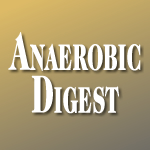BioCycle September 2013, Vol. 54, No. 9, p. 20
Roseville, Illinois: U.S. Dairy 2014 Sustainability Awards Nominations
The Innovation Center for U.S. Dairy®, established under the leadership of dairy producers, is accepting nominations for the third year of the U.S. Dairy Sustainability Awards. These awards recognize outstanding dairy farms, businesses and collaborative partnerships for management practices that result in triple-bottom line success (i.e., economic, environmental and social benefits). To help kick off this year’s call for nominations, the Innovation Center released a new video documentary series, Dairy’s Sustainability Journey, produced in collaboration with the World Wildlife Fund (WWF). The WWF and the Innovation Center are working together with the nation’s dairy producers to develop, adopt and share new, science-based practices leading to a more sustainable dairy industry. The short videos feature the 2013 winners of the U.S. Dairy Sustainability Awards on their respective farm or operation — showing sustainability practices in action.
The nominations for 2014 are open through November 15, 2013, to all segments of the U.S. dairy value chain — from farm to table — for the following categories: Outstanding Dairy Farm Sustainability; Outstanding Dairy Processing & Manufacturing Sustainability; Outstanding Achievement in Renewable Energy; and Outstanding Achievement in Energy Efficiency. An independent panel of judges will evaluate all nominations based on results of the project or initiative as measured by triple-bottom-line success, as well as the potential for other dairy farms and businesses to adopt the practices, the demonstrated learning, innovation and improvement, and scalability.
Winners will be announced in Washington D.C. in April 2014. There is no fee to enter.
Download application
Pierce County, Washington: Transit Agency Buses Running On RNG
Effective last June, Pierce Transit — the public transit authority of Pierce County —received approval from the U.S. Environmental Protection Agency to fuel its bus fleet with Renewable Natural Gas (RNG) produced at the King County (Washington) landfill in Maple Valley, south of Seattle. The EPA approval has led to using the conditioned biogas to fuel about 145 of its 155 buses on RNG. According to Western Washington Clean Cities Coalition, Pierce Transit is believed to be the first transit agency in the nation to adopt environment-friendly RNG fuel for public transportation purposes. “Renewable natural gas is among the most climate-friendly fuels on the market today,” says Scott DeWees, Project Manager. “Using this locally-produced, waste-derived fuel reduces the carbon emissions of Pierce Transit’s fleet by 80 percent — while also investing in our regional economy.”
Until 2010, 100 percent of the buses were fueled by compressed natural gas (CNG), before the agency opted to switch about 10 percent of its fleet to diesel-fueled hybrid electrics. Although diesel prices per gallon fluctuate wildly, the rate per therm for natural gas has been relatively stable for Pierce Transit. The recent move from CNG to RNG was supported by Cost Management Services, Inc. (CMS), the transit agency’s natural gas marketer since 2000. The Mercer Island-based company arranges the purchases and delivery of Pierce Transit’s natural gas, including its supply of biogas from the Cedar Hills Landfill. The Agency spends about $.70 per gallon equivalent on average for RNG, which is the same rate for CNG. The current contract with CMS commits the Agency to using 5,000 therms/day of RNG, however, Senior Manager of Maintenance Bill Spies reports that Pierce Transit is currently using about 6,000 therms/day and is likely to use more as service hours increase. Even prior to the move to RNG, the Agency saved about $2.4 million in its 2013 budget by purchasing CNG fuel, as compared to an equivalent amount of diesel. The Agency also earned $775,000 in alternative fuel tax credits, and is already starting to receive modest rebates for its recent move to RNG.
Western Washington Clean Cities Coalition
Cost Management Services
Pierce Transit
Links to more information about this program are in the on-line version of Anaerobic Digest.
New York, New York: Community Guide To Turning Waste Into Vehicle Fuel
Energy Vision, a nonprofit organization based in New York City that promotes use of renewable natural gas made from organic waste streams as vehicle fuel, just released “Turning Waste Into Vehicle Fuel: Renewable Natural Gas (RNG) …. A Step-By-Step Guide For Communities.” Production of the guide was funded by the U.S. Department of Energy’s Clean Cities program (part of the Office of Energy Efficiency and Renewable Energy). “This Guide has two overall goals: The first is to clarify the distinct and significant contribution that waste-based natural gas can make in reducing U.S. dependence on oil — primarily for transportation fuel — that puts our country’s environmental, health and economic future at risk,” explains Joanna Underwood, president of Energy Vision (EV), who coauthored the publication with Matthew Tomich, EV’s director of research and outreach. “The second goal is to provide communities with the steps they can take to turn their residential and commercial organic wastes, and possibly the organic wastes generated locally by farms, dairies, food processing plants, restaurants and other such sources, into a clean, secure, money-saving fuel solution. …. This [RNG] fuel is interchangeable with fossil natural gas but has distinct advantages over it. Waste-based natural gas generates close to zero greenhouse gases on a well-to-wheels basis, produces almost no health-threatening particulate emissions, and its production requires no drilling! By throwing away all manner of organic wastes, Americans have actually been destroying a vast renewable fuel feedstock while also draining public budgets.” An article based on the Energy Vision guide will appear in the next issue of BioCycle.










